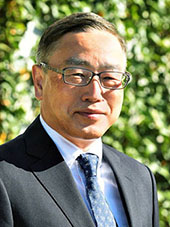Towards the dramatic expansion of Fuel Cell utilization

Fuel cells are expected to play a central role in the use of hydrogen energy, whose position was emphasized in Japan’s “Basic Energy Plan (Fifth)”. In 2018, the New Energy and Industrial Technology Development Organization (NEDO) released the “NEDO Fuel Cell / Hydrogen Technology Development Roadmap” (hereinafter referred to as the “NEDO Technology Map”), which organizes technical issues in chronological order and the importance of working on technological development by industry, academia and government collaboration was shown there. In order to achieve this, there is a strong demand from the industry for the practical application of low-cost, high-efficiency, high-output, and high-durability fuel cells through innovative research and development of fuel cell materials. It is necessary to carry out the research and development by the best use of high-level collaboration between industry, academia and government.
This center was established in April 2008 with the tremendous support of Yamanashi Prefecture and related ministries and agencies with the aim of contributing to the full-scale spread of fuel cells. The Ministry of Economy, Trade and Industry, NEDO commissioned a project “Development of basic materials for high-performance cells that integrate deterioration mechanism and nanotechnology” (abbreviation: HiPer-FC project, 2008-2014), and a project “Creation of material concept related to cell stack / Concept creation of high output, high durability, high performance fuel cell material” (abbreviation: SPer-FC project, 2015-2019). In these projects, through the fusion of knowledge related to the mechanism of reaction and deterioration and advanced technologies such as nanotechnology (HiPer-FC project), the creation of new catalysts, carriers and electrolyte materials, and the evaluation and analysis of catalyst layers that maximize their functions, we have worked to improve output performance, reduce the amount of precious metals used, and improve durability, and have achieved the goal of improving performance by about 10 times with overall effects (SPer-FC project).
Currently, in order to enable the dramatic expansion of the use of fuel cells, we are developing innovative material technology that realizes technologies such as high-efficiency power generation, high-load operation, high-durability start-stop, and prevention of deterioration in extreme environments, (NEDO consignment project, naming: ECCEED’30-FC project). Also, we are working on the creation of a new polymer electrolyte membrane concept and catalyst with ceramic support technology concept that can operate even in high temperature and low humidity environments (NEDO consignment project, naming: ECCEED’40-FC project). Furthermore, with the support of various national projects, we are working on the research and development on non-precious metal catalysts and anion exchange type electrolyte materials to realize inexpensive, highly efficient and highly durable anion exchange type fuel cells and water electrolyzers. We would like to contribute to the dramatic expansion of hydrogen and fuel cell use by making the results of these research and development widely available to everyone in the industrial world.
In this way, this center makes full use of the world’s top-level advanced equipment and a team of versatile researchers so that it can respond to a full-scale hydrogen society that makes dramatic use of fuel cells, and at the same time, joint research between industry, academia and government. We are also actively involved in graduate school education, creating cutting-edge research results and developing researchers and engineers who will lead the green energy field.
We look forward to your continuous warm support and guidance.
Akihiro IIYAMA
Director, Hydrogen and Fuel Cell Nanomaterials Center
University of Yamanashi

